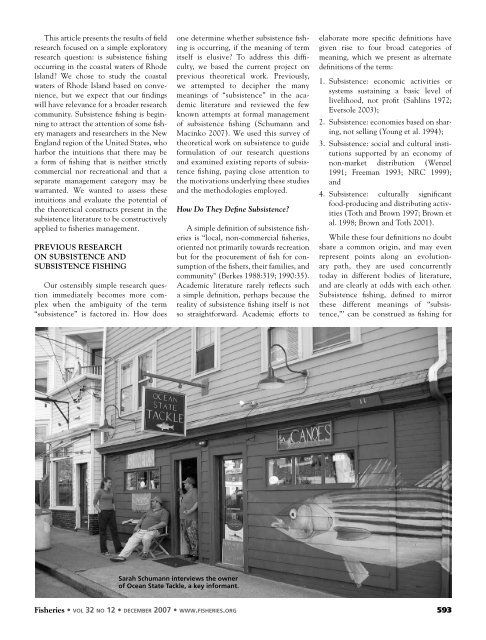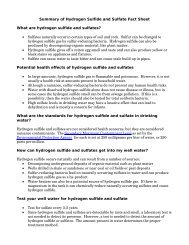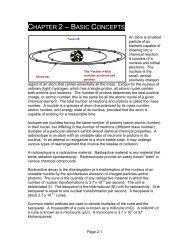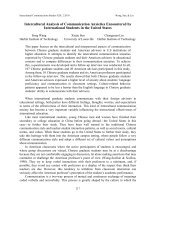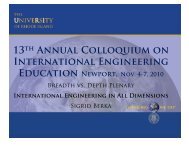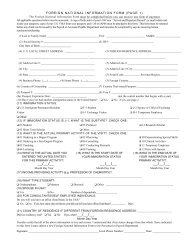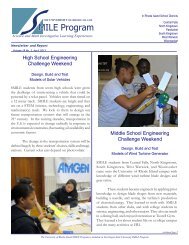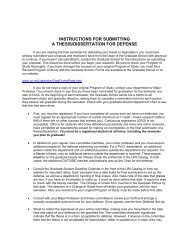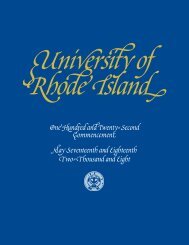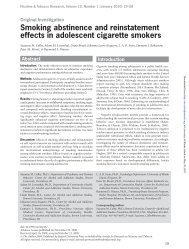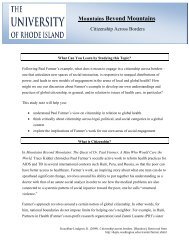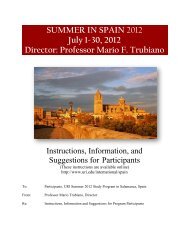FEATURE:HUMAN DIMENSIONS<strong>Search<strong>in</strong>g</strong> <strong>for</strong> <strong>Subsistence</strong>:<strong>In</strong> <strong>the</strong> <strong>Field</strong> <strong>in</strong> <strong>Pursuit</strong> <strong>of</strong> an ElusiveConcept <strong>in</strong> Small-scale FisheriesTras la subsistencia:en búsqueda de un conceptoelusivo en pesquerías artesanalesSeth Mac<strong>in</strong>ko and Sarah SchumannMac<strong>in</strong>ko is an assistant pr<strong>of</strong>essor and Schumann is an <strong>in</strong>dependent fisheries analyst at <strong>the</strong>Department <strong>of</strong> Mar<strong>in</strong>e Affairs, <strong>University</strong> <strong>of</strong> Rhode Island, K<strong>in</strong>gston. Mac<strong>in</strong>ko can be contacted at mac<strong>in</strong>ko@uri.edu..ABSTRACT: <strong>In</strong> small-scale fisheries, <strong>the</strong>re can be no morevulnerable participants than those compris<strong>in</strong>g <strong>the</strong> subsistencefish<strong>in</strong>g sector. Yet “subsistence” is an ambiguous term <strong>in</strong>fisheries management and <strong>the</strong>re is little applied researchdirected at this sector. The first step towards <strong>in</strong>corporat<strong>in</strong>gsubsistence fish<strong>in</strong>g <strong>in</strong>to <strong>for</strong>mal strategies <strong>for</strong> manag<strong>in</strong>g smallscalefisheries will be <strong>the</strong> atta<strong>in</strong>ment <strong>of</strong> a fuller understand<strong>in</strong>g<strong>of</strong> subsistence fishermen and <strong>the</strong>ir activities. This articlebuilds <strong>of</strong>f earlier work by <strong>the</strong> authors (survey<strong>in</strong>g conceptualvariation <strong>in</strong> <strong>the</strong> literature and worldwide attempts at <strong>for</strong>malmanagement regimes <strong>for</strong> subsistence fish<strong>in</strong>g) by report<strong>in</strong>g onfield ef<strong>for</strong>ts to locate and def<strong>in</strong>e subsistence fish<strong>in</strong>g activities<strong>in</strong> a specific location—Rhode Island, USA. Substantialmethodological and <strong>in</strong>stitutional challenges were encounteredand <strong>the</strong>se challenges are reviewed <strong>in</strong> terms <strong>of</strong> <strong>the</strong> implications<strong>for</strong> <strong>in</strong><strong>for</strong>med consideration <strong>of</strong> <strong>the</strong> place <strong>of</strong> subsistence fish<strong>in</strong>g<strong>in</strong> small-scale fisheries.RESUMEN: En las pesquerías artesanales, no hay participantesmás vulnerables que los que componen la división de pescade subsistencia. S<strong>in</strong> embargo “subsistencia” es un térm<strong>in</strong>oambiguo en el manejo de pesquerías y la <strong>in</strong>vestigación aplicadaa este sector es poca. El primer paso para <strong>in</strong>corporar la pescade subsistencia a las estrategias <strong>for</strong>males de manejo de la pescaartesanal será un pr<strong>of</strong>undo entendimiento de los propiospescadores y sus actividades. Este artículo canaliza el trabajoprevio de los autores (sondeando en la literatura variacionesde un concepto e <strong>in</strong>iciativas a nivel mundial para <strong>in</strong>corporarla pesca de subsistencia dentro de los regímenes <strong>for</strong>malesde pesca) mediante el reporte de trabajos en campo de laubicación y def<strong>in</strong>ición de actividades de pesca de subsistenciaen localidades particulares—Rhode Island, EEUU. Duranteeste proceso, surgieron retos metodológicos e <strong>in</strong>stitucionalesimportantes, mismos que fueron revisados en térm<strong>in</strong>os de lasimplicaciones que éstos tienen en las op<strong>in</strong>iones <strong>in</strong><strong>for</strong>madasacerca del lugar que tiene la pesca de subsistencia dentro dela pesca artesanal.<strong>Subsistence</strong> fish<strong>in</strong>g is frequentlyalluded to <strong>in</strong> <strong>in</strong>troductory fisheries textbooks,but rarely actually studied, andeven less frequently addressed <strong>in</strong> managementschemes. The existence <strong>of</strong>subsistence fish<strong>in</strong>g may pose significantimplications <strong>for</strong> management: “To a largeextent, <strong>the</strong> subsistence fishery is not be<strong>in</strong>greported <strong>in</strong> fishery statistics, monitored,assessed or regulated. If <strong>the</strong>re is <strong>in</strong>deeda significant subsistence fishery sector,this has implications <strong>for</strong> public policyregard<strong>in</strong>g resource management, allocation,impact assessment and regionaleconomic plann<strong>in</strong>g” (Berkes 1990:35).Specifically, researchers have suggestedthat subsistence fish<strong>in</strong>g may call <strong>for</strong> a differentk<strong>in</strong>d <strong>of</strong> management: “Moreover,<strong>the</strong> methods employed to manage subsistence,recreational, small-scale and<strong>in</strong>dustrial commercial fisheries are likelyto differ substantially, and until <strong>the</strong>sesectors are recognized and characterized,appropriate approaches are unlikely tobe <strong>for</strong>malized" (Branch et al. 2002a:477;c.f. Berkes 1990). <strong>In</strong> part, <strong>the</strong> belief thatit may be important to dist<strong>in</strong>guish subsistencefish<strong>in</strong>g from o<strong>the</strong>r k<strong>in</strong>ds <strong>of</strong> fish<strong>in</strong>gseems to be <strong>in</strong><strong>for</strong>med by a concernthat <strong>the</strong> groups <strong>in</strong>volved are marg<strong>in</strong>al,vulnerable populations—but researchersrout<strong>in</strong>ely acknowledge that this cannotbe confirmed because so little <strong>for</strong>malresearch is directed towards subsistencefish<strong>in</strong>g (Berkes 1990; Harris et al. 2002).<strong>In</strong> our view, <strong>the</strong> way <strong>for</strong>ward is relativelyclear. The research communitymust learn more about both <strong>the</strong> character<strong>of</strong> subsistence fish<strong>in</strong>g (how different is it,if at all, from o<strong>the</strong>r <strong>for</strong>ms <strong>of</strong> fish<strong>in</strong>g coveredby exist<strong>in</strong>g management categories)and how extensive is it. Only this can<strong>in</strong><strong>for</strong>m decisions as to whe<strong>the</strong>r dist<strong>in</strong>ctmanagement measures are called <strong>for</strong> <strong>in</strong>particular contexts.592 Fisheries • VOL 32 NO 12 • DECEMBER 2007 • WWW.FISHERIES.ORG
This article presents <strong>the</strong> results <strong>of</strong> fieldresearch focused on a simple exploratoryresearch question: is subsistence fish<strong>in</strong>goccurr<strong>in</strong>g <strong>in</strong> <strong>the</strong> coastal waters <strong>of</strong> RhodeIsland? We chose to study <strong>the</strong> coastalwaters <strong>of</strong> Rhode Island based on convenience,but we expect that our f<strong>in</strong>d<strong>in</strong>gswill have relevance <strong>for</strong> a broader researchcommunity. <strong>Subsistence</strong> fish<strong>in</strong>g is beg<strong>in</strong>n<strong>in</strong>gto attract <strong>the</strong> attention <strong>of</strong> some fisherymanagers and researchers <strong>in</strong> <strong>the</strong> NewEngland region <strong>of</strong> <strong>the</strong> United States, whoharbor <strong>the</strong> <strong>in</strong>tuitions that <strong>the</strong>re may bea <strong>for</strong>m <strong>of</strong> fish<strong>in</strong>g that is nei<strong>the</strong>r strictlycommercial nor recreational and that aseparate management category may bewarranted. We wanted to assess <strong>the</strong>se<strong>in</strong>tuitions and evaluate <strong>the</strong> potential <strong>of</strong><strong>the</strong> <strong>the</strong>oretical constructs present <strong>in</strong> <strong>the</strong>subsistence literature to be constructivelyapplied to fisheries management.PREVIOUS RESEARCHON SUBSISTENCE ANDSUBSISTENCE FISHINGOur ostensibly simple research questionimmediately becomes more complexwhen <strong>the</strong> ambiguity <strong>of</strong> <strong>the</strong> term“subsistence” is factored <strong>in</strong>. How doesone determ<strong>in</strong>e whe<strong>the</strong>r subsistence fish<strong>in</strong>gis occurr<strong>in</strong>g, if <strong>the</strong> mean<strong>in</strong>g <strong>of</strong> termitself is elusive? To address this difficulty,we based <strong>the</strong> current project onprevious <strong>the</strong>oretical work. Previously,we attempted to decipher <strong>the</strong> manymean<strong>in</strong>gs <strong>of</strong> “subsistence” <strong>in</strong> <strong>the</strong> academicliterature and reviewed <strong>the</strong> fewknown attempts at <strong>for</strong>mal management<strong>of</strong> subsistence fish<strong>in</strong>g (Schumann andMac<strong>in</strong>ko 2007). We used this survey <strong>of</strong><strong>the</strong>oretical work on subsistence to guide<strong>for</strong>mulation <strong>of</strong> our research questionsand exam<strong>in</strong>ed exist<strong>in</strong>g reports <strong>of</strong> subsistencefish<strong>in</strong>g, pay<strong>in</strong>g close attention to<strong>the</strong> motivations underly<strong>in</strong>g <strong>the</strong>se studiesand <strong>the</strong> methodologies employed.How Do They Def<strong>in</strong>e <strong>Subsistence</strong>?A simple def<strong>in</strong>ition <strong>of</strong> subsistence fisheriesis “local, non-commercial fisheries,oriented not primarily towards recreationbut <strong>for</strong> <strong>the</strong> procurement <strong>of</strong> fish <strong>for</strong> consumption<strong>of</strong> <strong>the</strong> fishers, <strong>the</strong>ir families, andcommunity" (Berkes 1988:319; 1990:35).Academic literature rarely reflects sucha simple def<strong>in</strong>ition, perhaps because <strong>the</strong>reality <strong>of</strong> subsistence fish<strong>in</strong>g itself is notso straight<strong>for</strong>ward. Academic ef<strong>for</strong>ts toelaborate more specific def<strong>in</strong>itions havegiven rise to four broad categories <strong>of</strong>mean<strong>in</strong>g, which we present as alternatedef<strong>in</strong>itions <strong>of</strong> <strong>the</strong> term:1. <strong>Subsistence</strong>: economic activities orsystems susta<strong>in</strong><strong>in</strong>g a basic level <strong>of</strong>livelihood, not pr<strong>of</strong>it (Sahl<strong>in</strong>s 1972;Eversole 2003);2. <strong>Subsistence</strong>: economies based on shar<strong>in</strong>g,not sell<strong>in</strong>g (Young et al. 1994);3. <strong>Subsistence</strong>: social and cultural <strong>in</strong>stitutionssupported by an economy <strong>of</strong>non-market distribution (Wenzel1991; Freeman 1993; NRC 1999);and4. <strong>Subsistence</strong>: culturally significantfood-produc<strong>in</strong>g and distribut<strong>in</strong>g activities(Toth and Brown 1997; Brown etal. 1998; Brown and Toth 2001).While <strong>the</strong>se four def<strong>in</strong>itions no doubtshare a common orig<strong>in</strong>, and may evenrepresent po<strong>in</strong>ts along an evolutionarypath, <strong>the</strong>y are used concurrentlytoday <strong>in</strong> different bodies <strong>of</strong> literature,and are clearly at odds with each o<strong>the</strong>r.<strong>Subsistence</strong> fish<strong>in</strong>g, def<strong>in</strong>ed to mirror<strong>the</strong>se different mean<strong>in</strong>gs <strong>of</strong> “subsistence,”’can be construed as fish<strong>in</strong>g <strong>for</strong>Sarah Schumann <strong>in</strong>terviews <strong>the</strong> owner<strong>of</strong> Ocean State Tackle, a key <strong>in</strong><strong>for</strong>mant.Fisheries • VOL 32 NO 12 • DECEMBER 2007 • WWW.FISHERIES.ORG 593


